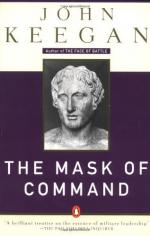
|
| Name: _________________________ | Period: ___________________ |
This test consists of 15 multiple choice questions and 5 short answer questions.
Multiple Choice Questions
1. Was staying hidden terrible to Hitler?
(a) No, because he was ascinated by the machine that was the Catholic Church.
(b) Yes, because he missed the attention from the crowds.
(c) Yes, because he wanted to be seen by his people.
(d) No, because he no longer wanted to be out in public.
2. Keegan outlines Hitler's strategies and includes pertinent information from various sources, including notes from a conference in ___________________.
(a) Berlin.
(b) Hamburg.
(c) Munich.
(d) Rastenburg.
3. What did Lincoln proclaim about Grant?
(a) The need for this will.
(b) The need for his fortitude.
(c) The need for his intelligence.
(d) The need for his skills.
4. The year was 1862, and Grant was serving as the Commander of the District of __________________.
(a) Western Tennessee.
(b) Northern West Virginia.
(c) Southern Kentucky.
(d) Eastern Indiana.
5. Hitler believed that Germany could rise if only what?
(a) Poland was destroyed.
(b) It was given a second chance.
(c) The U.S. was destroyed.
(d) The Jews were exterminated.
6. WWII would become what for Hitler?
(a) An exciting adventure.
(b) His re-creation of WWI, only with Germany arising victorious.
(c) A nightmare.
(d) Revenge for the death of his mother.
7. When did things change for Grant?
(a) When Virginia left the Union.
(b) After the initial attack on Fort Sumter.
(c) When Texas seceded.
(d) When the Union attacked the Rebels at Fort Sumter.
8. As a replacement for his presence, in what did Hitler engage?
(a) A television special.
(b) A film.
(c) A strike.
(d) Propaganda.
9. Grant received a bit of notoriety after a stint where?
(a) Along the Mississippi.
(b) Near the Mexican border.
(c) Out west.
(d) In Europe.
10. While Grant may have been surrounded by more than his share of ordinary men, there were at least two that stood out to the commander. They were Lieutenant Colonel Rawlins, Assistant Adjutant General, and ________________, Aide de Camp.
(a) Captain Boners.
(b) Captain Boon.
(c) Captain Bonneville.
(d) Captain Brooke.
11. Western civilization considered WWI as ___________ war due to its impact on European culture and history as well as the mystery surrounding the war itself.
(a) "One."
(b) "The."
(c) "Some."
(d) "A."
12. At best, Grant's troops could evade and stall until help arrived from another Union battalion located _________ miles away, a distance that would take half a day to cover.
(a) Eighteen.
(b) Nine.
(c) Twenty-three.
(d) Four.
13. Keegan points out that there are some factors overlooked or glossed over by many _____________________ regarding Hitler's early war experiences.
(a) Germans.
(b) American historians.
(c) Military leaders.
(d) Historians and biographers.
14. On what did Clausewitz focus?
(a) The reparations that must take place after a battle.
(b) The battlefield.
(c) The end of the battle.
(d) Occupation of the capital.
15. Hitler taunted who's ignorance of the Clausewitz work?
(a) His soldiers'.
(b) The Americans'.
(c) The British's.
(d) His generals'.
Short Answer Questions
1. Although Hitler would serve ______________ years as high commander, it was not the man's first foray into the military arena.
2. Chapter six, " Grant on Campaign", discusses what?
3. West Point would go on to graduate many notable people, including President Eisenhower, James McNeil Whistler, and __________________.
4. Who failed to back up Poland, thereby sealing the country's fate?
5. By mid-afternoon on April 6, nearly _______________ of Grant's army had deserted their posts and waited for a chance to escape the battlefield.
|
This section contains 540 words (approx. 2 pages at 300 words per page) |

|




